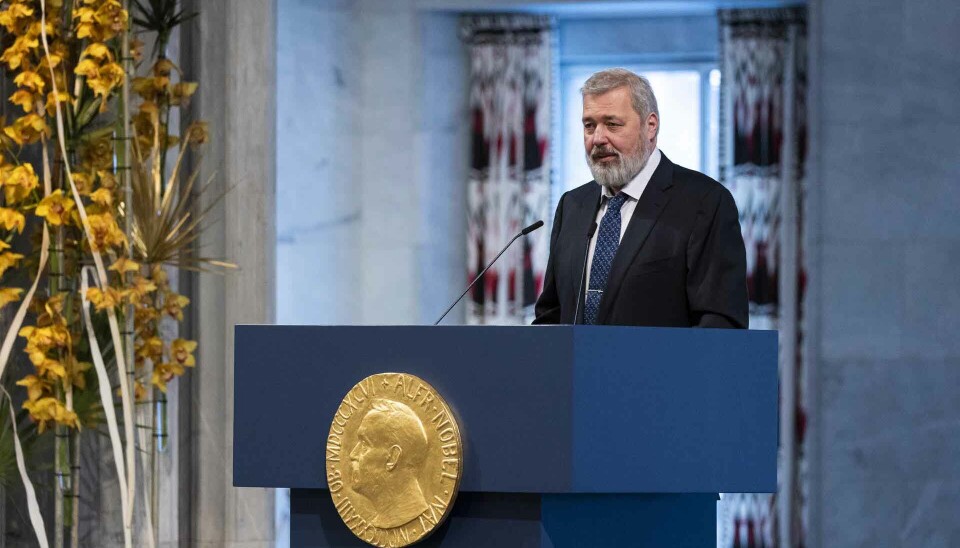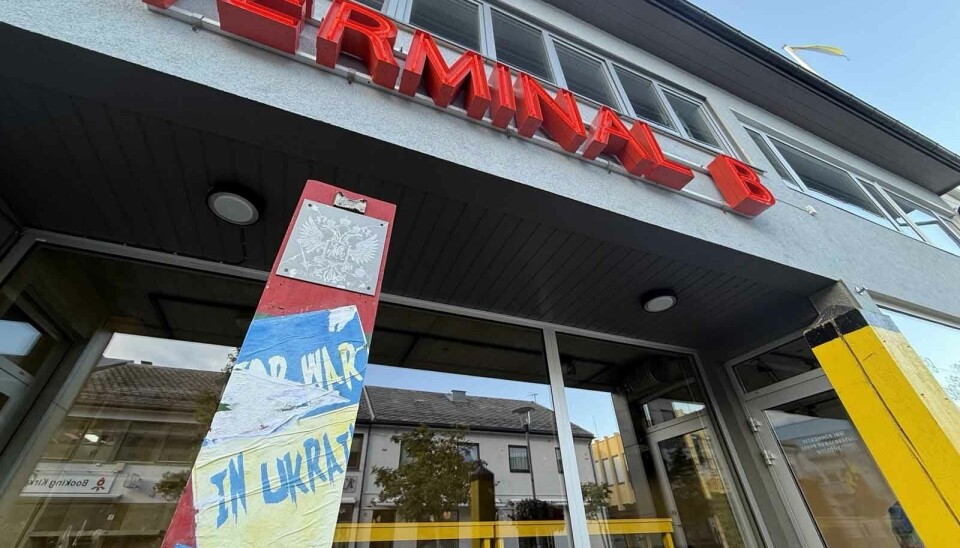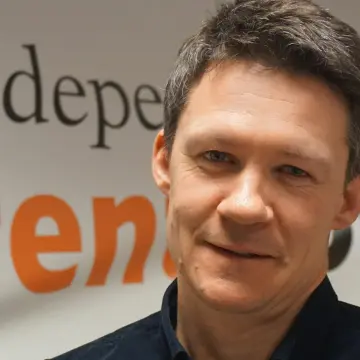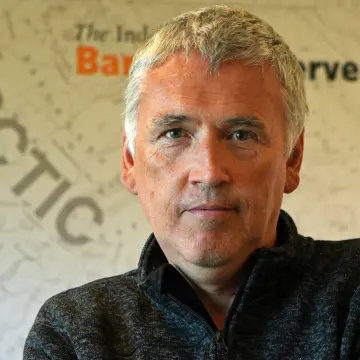OPINION

Dmitry Muratov brings FSB's playbook when he comes to Kirkenes to talk about "censorship"
The Nobel Peace Prize winner is travelling from Moscow to the Norwegian border town to speak about "censorship." But he refuses to talk with the only Russian-language newspaper in Norway because it is considered 'undesirable' by the Kremlin's censorship regime.
Novaya Gazeta has been a leading star of media freedom and independence in Russia since the 1990s and Dmitry Muratov its main advocate. The newspaper has paid a high price; several of its journalists have been killed and attacks by Kremlin-loyal extremist groups continue until this day.
Muratov surely deserved the award he got in 2021. The Norwegian Nobel Committee argued that “free, independent and fact-based journalism served to protect against abuse of power, lies and war propaganda.”
With his visit to Kirkenes, Dmitry Muratov seems to divert from this direction.
The Nobel Peace Prize laureate is the main headliner when the local art group Pikene på Broen on September 10-13 invites to a so-called "Censorship Week”. The premises of Pikene will be transformed into the "Svoboda Bar" (Freedom Bar) and there will be "conversation and an art program about censorship and democracy.”
The program hardly includes the word "war" and does not even mention Ukraine.
It is beyond our understanding how it is possible to talk about Russia’s unprecedented censorship without explaining that the main reason for quashing dissenting voices is to cover up the bestial warcrimes and aggression against Ukraine.
This is why the Kremlin blocks Russian-language media abroad, puts journalists in jail, murders opponents, and heavily censors the internet.
The Barents Observer contacted Novaya Gazeta and Dmitry Muratov to ask for an interview when he comes to town.
But Muratov does not want to grant an interview to the Barents Observer because of our status as 'undesirable organisation.' According to the Kremlin's perverted laws, it is illegal for the editor to talk on the record with us. He can give interviews to any other Norwegian media, but not to the Barents Observer. Russia's aggressive and repressive authorities declare free and independent voices as 'undesirable' in order to silence opposition and curb alternative sources of information.
Contact with 'undesirable organisations' includes risk of criminal charges for Russian citizens. The Barents Observer is the only media in the Nordic region with this status.
This is an example of how the Kremlin is expanding censorship beyond Russia's geographical borders. The Russian population is to be barred from information from free and 'bothersome' sources, including about the war in Ukraine where Russia is committing horrible war crimes against civilians and kills hundreds of thousands of its own and Ukrainian men.
The Barents Observer was declared 'undesirable' on February 7 this year. The day before, on February 6, the European Court of Human Rights ruled that we had won the case against Russia. The story started in 2019, when we took the censorship agency Roskomnadzor to court following the blocking of our news site in Russia. We lost the case in Moscow courts, but won in the ECHR.
By refusing to speak on the record with a free Norwegian media censored by Russia, Muratov is actually bringing Russian censorship to Norway. In his home country people are allowed to speak only with the media approved by the Kremlin.
That is not the case in Norway. That is not the case in Europe.
By refusing to speak on the record with a free Norwegian media censored by Russia, Muratov is actually bringing Russian censorship to Norway.
Muratov either fundamentally fails to understand the deeply entrenched role of the free press in Norway, or he has lost his resolve after years of mounting pressure from the Kremlin.
In either case, his visit appears to be an attempt to export Moscow's rules of the game across the border.
In this perspective, Dmitry Muratov and the event organiser for Pikene are reading from the FSB's playbook. Like elsewhere in free and democratic Europe, the FSB is actively engaged in sowing discord and division and trying to undermine established facts.
For the FSB, the small Norwegian border town that for decades has been involved in close cross-border cooperation with Russia would seem an easy target.
Although the Barents Observer has repeatedly proven the security service wrong. And that is why we are speaking out again this time.
Questions can be raised about Pikene's motivation for organising the event. Judging from the event’s program, the organisers want a debate about censorship not only in Russia, but also in Norway.
Highlighted are so-called 'grey areas of censorship.' What Pikene brings to the table here is a darker grey colour. Made darker by the black shadows from the Kremlin walls.
Juxtaposing censorship in Russia and of freedom of speech in Norway is absurd. The suggestion that both are equally valid targets for criticism puts a smokescreen over the facts and draws attention away from what obviously should be our biggest concern: Russian totalitarianism and war against Ukraine.
Juxtaposing censorship in Russia and of freedom of speech in Norway is absurd

According to Pikene: "It is no coincidence that the censorship week is being held in Kirkenes." The art group explains that Kirkenes is "a hub for Russian artists, cultural practitioners and journalists in exile.”
However, none of the journalists now in exile in Kirkenes have been invited by Pikene to speak on stage. Maybe because they work for a media deemed 'undesirable' by Putin's Prosecutor General. If Muratov is the one exporting the consequences of Russian censorship, Pikene is surely the one importing the same consequences to Norway.
In contrast to the Russian journalists at the Barents Observer, who are declared not only to be ‘undesirable’, but also 'foreign agents' and 'extremists and terrorists' by Russian authorities, the "exiles" at Pikene are not on any of the Kremlin's wanted-lists. Actually, most of the Russians working at Pikene came to Norway before the full-scale war against Ukraine.
The main organiser of the event at Pikene was himself even a minister of culture in Murmansk under Governor Andrei Chibis until summer 2020, six years after the start of Russia's war against Ukraine and only about 1,5 years before the full-scale onslaught. Governor Chibis is a staunch supporter of the war and actively contributes to militarisation of schools, culture and society in the north Russian region.
Staying in Norway, enjoying the benefits of a free and open society, comes with some obligations. Not importing the consequences of the Kremlin's restrictive "laws" is one such duty. Pikene has over many years navigated in the cultural landscape of the Norwegian-Russian borderland. It has maintained an open door to interaction with Russian state institutions, but remains cautious about cooperation with contemporary anti-regime artists.
A former leader of the group expressed strong dislike for the punk group Pussy Riot, which in 2012 performed their song Punk Prayer in the Moscow downtown Cathedral of Christ the Savior. According to her, cultural cooperation in border regions is "more complex than other places.” In 2012, the group invited a major cultural delegation from North Korea to take part in its Barents Spektakel festival.
In Barents Spektakel 2019, the festival title was 'Chinatown', and a host of Chinese diplomats and businessmen were invited to town. In a Barents Observer's article about the event we described China as 'an authoritarian state,' and subsequently got a stern request from the festival organiser to remove the sentence.
It was not removed.
In a region that borders a repressive regime that is waging a war of aggression, the role of independent journalists fighting censorship is indispensable.
Nevertheless, the 'censorship week' in Kirkenes has decisively limited participation to censored local media.

















